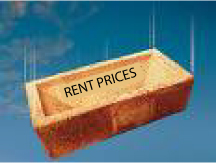Posted by Teresa on March 30, 2010 under General | 
 A real estate brokerage in Las Vegas, one of its agents, and the owners of a rental home were all recently sued in federal court for discrimination. Here’s what allegedly happened:
A real estate brokerage in Las Vegas, one of its agents, and the owners of a rental home were all recently sued in federal court for discrimination. Here’s what allegedly happened:
Back in 2008, a woman tried to rent a home the realty company listed. She says she was rejected because she told the agent she had applied to adopt three children, adding to the three she already had living with her. If true, this is a clear violation of the Fair Housing Act.
She alleges the agent replied that they were “hoping to rent to someone without children,” or something to that effect. The home was eventually rented to a family with one child.
What did the agent do wrong? Plenty: It is illegal to make rental housing unavailable or deny rental housing because of family status, under the Fair Housing Act. His statement, if true, violates the FHA.
The real estate company denies the allegations, and says there is no evidence to support them. Their side of the story is that the prospective tenant refused to pay the asking rent.
While there are always people who look for a lawsuit around every corner, and every suit has two sides, there is no doubt that being sued is no fun. It can cost landlords plenty of time and money. Even if you’re completely innocent, proving that is a big hassle. And what about the bad publicity? Innocent, defendants can suffer negative reactions for months or years to come.
The best way to avoid this type of lawsuit is to watch everything you say to prospective tenants. Don’t ask about their personal situation. Keep every conversation and interaction 100% professional. If they ask if the neighborhood is safe, have them look up local crime statistics online. If they ask if you like kids, tell them what you think about kids doesn’t matter, and that your job is to make sure the rental units are rented fairly no matter what the applicant’s family situation.
Base decisions to accept or reject each tenant applicant on the same factors: proper income level, verified employment and income, acceptable credit history check, passing criminal background screening, and any other verification you require.
Don’t judge any books by their covers—the scariest-looking people sometimes make the most peaceful, easiest tenants. And Mr. and Mrs. Clean could be hiding some scary secrets behind their appearance. In the landlord business—you just never know.
Posted by Teresa on March 27, 2010 under Landlord Tenant Lawsuits, Landlord Tips | 
 Learning by others’ mistakes is a classic move. So read on for a few errors landlords can avoid—just because others have already made them.
Learning by others’ mistakes is a classic move. So read on for a few errors landlords can avoid—just because others have already made them.
Security deposits: Seems like security deposit issues are a top-5 cause of disputes between landlords and tenants. The problem can often be traced to miscommunications and unspoken expectations. Tenants sometimes assume they will receive 100% of their deposit back. It’s not their fault if they don’t understand how it works—it’s your job to fully explain the process, and what they stand to lose if they damage or otherwise alter the condition of the rental unit after they move in.
Have new tenants sign a statement that they have reviewed and understand your security deposit policy, move-in and move-out inspection lists, and then follow up with a thorough initial walk-through of the rental unit. Take photos and have tenants initial the condition of each item on the list. When they are ready to move out, schedule another walk-through with the tenant, establish damages and take more photos.
Failure to document, document, document. Keep pristine records—you never know when you’ll need them. Each tenant’s application, background screening and credit check report, lease documents and correspondence should be kept on file until three years after the end of the lease. Keep notes of emails and notes conversations, too (aside from the “nice day, huh?” conversations). Just keeping good records shows that you’re serious about your business—and someday, if you find yourself in front of a judge over a landlord/tenant dispute, it could work in your favor. It certainly can’t hurt!
Unintentional discrimination: Being discriminatory is not always a planned situation. Some landlords may mean well when asking a disabled tenant applicant about their wheelchair or asking if a 2 potential tenants plan to have children—but those questions themselves can be considered illegal. By avoiding personal questions of applicants, you could be avoiding possible legal trouble.
Not treating all tenants equally: Not only is it easier to be consistent in how you deal with tenants, it can also keep you safe legally. Don’t allow Tenant A to pay rent four days late when you never allow Tenant B a single day of leeway. Don’t enforce your “no smoking” rule for one tenant and not the others. Don’t fix a water drip immediately in the apartment of the tenant you like to talk to, but make an “unstable” tenant wait a week for a repair. Be fair and enforce all rules the same way to all your tenants. It’s easier to explain to a tenant that you’re sorry, but you have to apply the rules equally—and it can help you avoid a fair housing complaint, and a call to your lawyer!
Posted by Teresa on March 23, 2010 under General | 
 Having a website to highlight your rental properties is an effective tool to keep in your marketing toolbox. If you have a working knowledge of blog site platforms, like WordPress, you could set a site up yourself in minutes. Or, hire a web developer and designer to create a custom site for your business.
Having a website to highlight your rental properties is an effective tool to keep in your marketing toolbox. If you have a working knowledge of blog site platforms, like WordPress, you could set a site up yourself in minutes. Or, hire a web developer and designer to create a custom site for your business.
What are important factors to consider when setting up a rental property website?
- Determine what you want the site to do for you. Do you want to communicate securely with tenants? Accept online rent payments or maintenance requests? What about making standard forms available for download? Or a classifieds area for your tenants, where they can advertise items to buy or sell? Or do you just want to promote and highlight your rental properties? Knowing exactly what you want will help your developer plan the site properly.
- Make sure you can update the site yourself. Most sites these days are built on Content Management Systems (CMS). These database-driven platforms enable users to easily change and update content—with new text, photos, news, blog posts and articles.
- Invest in a decent camera. You’ll want a wide range of quality photos to display your properties in their best possible light. Don’t forget to add captions so visitors know what they’re looking at. Make the descriptions inviting; keep in mind what your target tenants are looking for and use sales language that will appeal to them.
- Be sensitive to discriminatory language and photos. Keep the Fair Housing Act (FHA) top of mind while putting together your website. Include a statement that your company does not discriminate against tenants based on race, color, religion, sex, national origin, family status, or disability. Include an Equal Housing Logo if you’d like. And if your photos show people, include a diverse assortment to make everyone feel welcome.
- Do not include photos of tenants without their permission. And never feature photos of children on your website. This might seem to contradict the idea of showing a diverse range of people, but most parents do not want their children’s photos to appear on the internet where predators can find them. Stock photos are available online that feature models who have signed releases for publishing—these are a safer bet.
- Be ready to promote your site. Don’t expect rental home hunters to just find it. Keep posting to Craigslist.com and any other advertising outlets your currently use, and link to your new site in every ad.
- Finally, consider a “contact us” form. You want to make it easy for prospective tenants to find you. Be sure you’re ready to respond quickly to each inquiry. Your web developer can explain how this interface works, and how to set up an automatic reply.
Websites are powerful marketing tools for businesses of all sizes—consider developing one for your rental property business.
Pre-screen all tenants as part of your standard application process. Background and credit checks will help ensure you rent to qualified tenants. For more landlord resources, including forms and information on tenant screening, turn to E-Renter.com.
Posted by Teresa on March 19, 2010 under Landlord Tips | 
 Like most articles about secrets, you’ll find that the ones we’re about to share with you are mostly common sense reminders—but every one needs easy-to-remember hints now and then.
Like most articles about secrets, you’ll find that the ones we’re about to share with you are mostly common sense reminders—but every one needs easy-to-remember hints now and then.
Landlording is about people, as well as the buildings they live in. If you’re a landlord, you probably spend much more time dealing with people than you do with the rental houses or apartment building you own. Successful leaders and managers of people have some common traits—and so do successful landlords.
The first is that they listen more than they talk. Your tenants want to be heard and understood. You can hear someone if you’re doing more talking than they are. The best tgift ou can give someone is to make them feel like they’re the only person in the world. You can do that by making eye contact and really focusing on your tenant and what they are saying. Indicate you’re listening and ask clarifying questions if they say something you do not understand. Repeat back to them what you just heard.
Successful landlords are strong and sometimes even stern. The word “no” is an important part of every landlord’s vocabulary. Making sure that all your tenants are treated fairly means saying “no” to certain requests. Being a pushover may make the current situation more tolerable, but it can lead to undermining your authority.
That doesn’t mean that successful landlords aren’t flexible. In fact, being willing to change a policy or admit you are wrong is vital to maintaining good relationships with your tenants. For example, more landlords are allowing pets than ever before; this helps fill vacancies and keeps animal-loving tenants happy.
Finally, successful landlords are some of the most patient people we know. This is no business for hotheads or those who are unwilling or unable to negotiate, renegotiate, and count to 10—or 100—several times every day. Watching what you say, taking a deep breath when a tenant is upset, and exercising patience in every situation will go a very long way to your success as a landlord. Remember, not everything is an emergency and, not every tenant is trying to get something over on you.
Listening, showing respect to people from all backgrounds, being patient and saying “no” are all common-sense attributes to successful rental property management.
Posted by Teresa on March 17, 2010 under Housing Trends | 
The National Association of Home Builders recently released its Multifamily Housing Market Index for the 4th Quarter 2009. The Index shows a dampening of enthusiasm among those polled, to say the least.
At the time the data was complied, rental housing vacancies were expected to continue increasing, as was supply. Asking rent dropped from the 3rd quarter, but effective rents rose slightly over the same period.
Another troubling figure from the report is Percent of New Apartments Rented within 90 days, which dropped from 45.8 in the 3rd quarter to 34.1 in the 4th.
However, a positive note is seen in the increase in volume of calls from prospective renters. That figure was 8 points higher than in Q3 2009 and 6 points higher than Q2 2009.
What does all this mean for rental property owners and managers? Well, if you are sitting on brand new apartments, you will likely need to work harder than before to get them rented. But that doesn’t mean your phone isn’t ringing at all—in fact, the index shows a healthy increase in Prospective Renter call volume.
Perhaps more amenities, rent concessions, or lower rent will continue to be required to fill these vacant properties. Are callers finding a better deal in single-family rentals? Are they staying home with mom and dad rather than move into their own apartment? Or do renters continue to double- and triple-up with their friends, waiting to see what happens with rents?
Whatever is going on in renters’ minds, the message is clear: the multifamily rental market is expected to stay soft—and painful for those who are in it—at least for the foreseeable future. Stay tuned for more fascinating facts and figures as they are reported!
Posted by Teresa on March 12, 2010 under Landlord and Tenant FAQs, Landlord Tips | 
 Not every landlord or property management company requires tenants to hold renter’s insurance policies. And according to some reports, the majority of tenants do not have renter’s insurance. What are the advantages to requiring tenant insurance? Are there any disadvantages?
Not every landlord or property management company requires tenants to hold renter’s insurance policies. And according to some reports, the majority of tenants do not have renter’s insurance. What are the advantages to requiring tenant insurance? Are there any disadvantages?
First, the cost for renter’s policies is solely borne by the tenant, and is only $15-$20 per month, on average. So, while there are those tenants who cannot afford it, are they the best fit for your rental properties? An insurance requirement automatically screens out the potential tenants who have financial difficulties.
What’s in it for the tenant? Just as homeowners who have property insurance to protect against loss due to fire, injury or natural disaster, tenants with insurance enjoy a level of protection and peace of mind that is well worth the investment. In the event of a fire, for example, replacement property can easily be obtained, helping the tenant begin again with necessities like furniture and clothing. Some policies offer temporary housing coverage, so the tenant can stay in a hotel worry-free.
Now, let’s imagine that the fire in this example was caused by the tenant’s negligence. Without insurance, the tenant would be responsible for reimbursing the landlord’s insurance company for any damages caused by the fire—which could be tens of thousands of dollars. With renter’s insurance, the tenant and landlord are both covered.
What’s in it for the landlord? Certainly, landlords who require tenants to carry insurance will have fewer hassles in the event of a disaster. Tenant insurance also adds a layer of protection when a visitor is injured in a tenant’s unit, for example. That visitor will likely seek damages from the tenant’s policy, rather than the landlord’s. If an uninsured tenant’s negligence results in major damage (like a flood or fire) to a multi-unit building, the landlord would be liable for all damages to the structure as well as other tenant’s injuries or losses.
Rental property owners—there are many advantages of requiring tenants to hold renter’s insurance—with more than just minimum coverage. Think about the potential for large losses due to the tenant’s negligence, and have your insurance agent advise on the minimum. Just make sure to require the same for all tenants. Together, the owner’s and tenant’s policies offer both parties a broader range of protection.
Posted by Teresa on March 9, 2010 under Landlord and Tenant FAQs | 
 More than 300,000 homes have received foreclosure notices in each of the last several months in the U.S., including plenty of rental properties whose owners cannot meet their loan obligations.
More than 300,000 homes have received foreclosure notices in each of the last several months in the U.S., including plenty of rental properties whose owners cannot meet their loan obligations.
What happens to tenants when the home they are renting is foreclosed upon?
According to the Protecting Tenants at Foreclosure Act, whoever takes title to a property under foreclosure must protect the rights of tenants. Tenants with a lease are allowed to stay to the end of the lease term, unless the property is sold to a buyer who intends to make the home a primary residence. In that case, the tenants must receive a 90-day termination notice. The same 90-day termination notice is required if there is no lease in place.
And how do you satisfy a tenant who demands proof that your property is safe from foreclosure?
Tenants who bring up foreclosure concerns may have been affected in the past, are worried about losing their security deposit, or have heard about rental properties being foreclosed upon. Landlords can reassure tenants that their property is safe from foreclosure, and inform them of their rights. Reassure tenants that their security deposit is safe, and let them know if it is held in a separate account, as is the law in many states.
However, your responsibility as a rental property owner most likely ends there, with no obligation to prove to your tenants that you pay your mortgage on time. Your financial records can remain private, no matter what a tenant may demand. To make tenants feel more comfortable, consider including language from the Protecting Tenants at Foreclosure Act in your lease.
Pre-screen all tenants as part of your standard application process. Background and credit checks will help ensure you rent to qualified tenants. For more landlord resources, including forms and information on tenant screening, turn to E-Renter.com.
Posted by Teresa on March 5, 2010 under Landlord and Tenant FAQs, Tenant Screening & Background Checks | 
 Verifying a tenant’s employment history and income is a vital step to approving his or her application. The unfortunate economic situation makes it even more important; while many good people have lost their jobs through no fault of their own, your tenants still need to pass your litmus tests, including meeting minimum income requirements.
Verifying a tenant’s employment history and income is a vital step to approving his or her application. The unfortunate economic situation makes it even more important; while many good people have lost their jobs through no fault of their own, your tenants still need to pass your litmus tests, including meeting minimum income requirements.
Here are five reasons to verify employment and income on potential tenants:
1. Because landlords and property managers must know that each tenant who signs a lease agreement can live up to its terms—including paying the security deposit and upfront fees, plus the rent in full each month. Whether the tenant will pay on time each month is certainly not guaranteed—but you need to know whether they even have the capability before you sign a lease.
2. Because even if the tenant has the upfront fees ready to hand over, you’ll want to know if their employment history is solid. Holding a job is no guarantee that a tenant will pay rent on time, but it helps!
3. Because verifying the source of a tenant’s income is a great way to prevent those engaging in illegal activities from becoming your problem. In other words, if a tenant has plenty of cash but no job, be suspicious. Same for obvious high spending with a low income. It is not discriminatory to ask a tenant to prove how much money they make. Remember: pay stubs are your friends.
4. Because tenants sometimes go to great lengths to pull a fast one on a landlord. Just because they say they’re working for Jones Construction Company doesn’t mean they do. Ask for proof. Call the supervisor—and make sure that when you do, you’re actually speaking to the supervisor, not a friend pretending to be one.
5. Because knowing that your new tenant is stable and can afford the rent is one less worry for you. And landlords and property managers need to reduce worries as much as possible!
Posted by Teresa on March 2, 2010 under Landlord and Tenant FAQs, Rents and Deposits | 
 While some landlords avoid bounced checks by requiring cash or money orders from tenants, most still accept checks—and the risk that goes with that. Studies show that while the number of online payment options grows, the number of checks being written is declining. Still, plenty of folks pay their bills—including rent—with checks.
While some landlords avoid bounced checks by requiring cash or money orders from tenants, most still accept checks—and the risk that goes with that. Studies show that while the number of online payment options grows, the number of checks being written is declining. Still, plenty of folks pay their bills—including rent—with checks.
What are your options when a tenant’s check is returned by your bank?
Depending on the state in which you do business, writing a bad check can range from a misdemeanor to a felony. And, bad checks can be treated by law enforcement as a serious matter—or as a nuisance. Follow these steps to avoid the need to involve your local police or sheriff’s department.
- The first thing most landlords do is to demand full payment from the tenant, including the amount of the check, plus a handling fee. Make sure this fee covers any bank charges for returned checks and your bookkeeping time.
- Check your state and local laws to determine if there is a limit to the amount you can collect as a returned check fee. Some states allow for penalties and interest; others limit landlords to a flat fee.
- Give your tenant a time limit to pay in full. Many landlords and property managers begin eviction proceedings if they have not collected the full amount due by the end of the time limit.
- It is perfectly reasonable to require payment in the form of a money order or certified check—and to require subsequent rent be paid in the same way.
- If you charge a late fee for late rent, remember your tenant will be responsible for that if they pay in full after the agreed-upon date. So add it to the total tab.
- When drawing up lease and rental agreements, be sure to include a provision that covers your policy on returned checks. Include the compensation language, time limits, and late fees, and your requirements for money orders and/or certified checks.
 A real estate brokerage in Las Vegas, one of its agents, and the owners of a rental home were all recently sued in federal court for discrimination. Here’s what allegedly happened:
A real estate brokerage in Las Vegas, one of its agents, and the owners of a rental home were all recently sued in federal court for discrimination. Here’s what allegedly happened:


 Like most articles about secrets, you’ll find that the ones we’re about to share with you are mostly common sense reminders—but every one needs easy-to-remember hints now and then.
Like most articles about secrets, you’ll find that the ones we’re about to share with you are mostly common sense reminders—but every one needs easy-to-remember hints now and then.

 More than 300,000 homes have received foreclosure notices in each of the last several months in the U.S., including plenty of rental properties whose owners cannot meet their loan obligations.
More than 300,000 homes have received foreclosure notices in each of the last several months in the U.S., including plenty of rental properties whose owners cannot meet their loan obligations.
 While some landlords avoid bounced checks by requiring cash or money orders from tenants, most still accept checks—and the risk that goes with that. Studies show that while the number of online payment options grows, the number of checks being written is declining. Still, plenty of folks pay their bills—including rent—with checks.
While some landlords avoid bounced checks by requiring cash or money orders from tenants, most still accept checks—and the risk that goes with that. Studies show that while the number of online payment options grows, the number of checks being written is declining. Still, plenty of folks pay their bills—including rent—with checks.